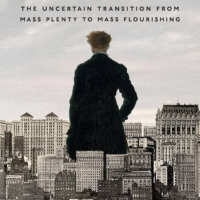In a New York Times op-ed, Laura Raicovich and Laura Hanna call for a generous increase in the way the government, in particular the federal government, funds arts institutions: As policymakers in Washington gather to draft a new budget for fiscal year 2025, they could solve culture’s current financial crisis and radically reshape how we think about sustaining the arts. They could do this by tapping into abundant appropriations that already enjoy bipartisan support. To make this possible, first we need to stop treating museums, theaters and … [Read more...]
Reading Brink Lindsey’s The Permanent Problem
Brink Lindsey takes his title from one of my favourite essays, John Maynard Keynes’s “Economic Possibilities for Our Grandchildren” (which I wrote about here). Keynes, in 1930, wondered what lives might be like in our present. There are three big predictions in the essay, interrelated, of which I would say he got two right, which ain’t bad. The first right prediction was about how the world’s material wealth would continue to grow, such that by this time we would be much more affluent in aggregate terms. We would … [Read more...]
He is beyond satire
Olga Neuwirth has composed an opera, “Monster’s Paradise”, with a libretto written by her and Elfriede Jelinek. You can see in the photo above, what it’s about. It is premiering at the Hamburg Opera, before going to Zurich and Vienna, and on their website there’s a two-minute video that gives a sense of what to expect. The creators say it is inspired by the Grand Guignol, and the 1896 play by Alfred Jarry, “Ubu Roi.” But any production must stand on its own, and here the mistake is thinking you can make political satire featuring Donald … [Read more...]
Representation and portrayal at the BBC
At home we watch a lot of BBC-produced television. Some of it is very good, some of it is very silly, but we are entertained enough. Anyone who has seen older and newer episodes of shows will pick up on the fact that productions at the BBC have made an increasing effort to include more non-white actors in shows (I’m going to use “non-white” as shorthand for all racial and ethnic minorities in Britain) as well as actors and characters with disabilities. This is true across the board, with programs that have either contemporary or historical … [Read more...]
Equality, the arts, and the problem of expensive tastes
Yesterday Rebecca Lowe mentioned in a note how much she enjoys reading the philosopher G.A. Cohen. I do too, and it reminded me of his part in an interesting, and I don’t think ever resolved, debate in arts policy. I’ll get to Cohen later, but first some background. Most people (I know not all people) care about equality between individuals. But equality of what? When we compare the situations of different people, which differences between them matter to us as an issue of moral concern, as something society ought to try to do … [Read more...]
Cultural policy: what don’t we know
This past week I’ve been sent different, interesting takes on the state of cultural policy research. My friend James Doeser, who is very smart about these things, has a short post “The crisis of cultural policy in the 21st century” that is well worth your time (update: here is James's second post). Friends and former colleagues Joanna Woronkowicz and Doug Noonan have a piece on whether we need more (unbiased, useful) evidence-based research on cultural policy. And the good people at the journal Cultural Trends recorded a session for podcast on … [Read more...]
Concessions prices: there oughtta be a law?
A reader, Kevin, asks if I had seen this new report by Brian Shearer at Vanderbilt University on legal remedies for high prices charged by different sorts of firms (airports, hospitals, car dealerships, etc) on “captive” consumers. I had not. I am no lawyer, and so I cannot speak to the various laws discussed in the paper. But I can say something about pricing at arts venues as an economist. Here is what Brian Shearer says about pricing at events: The cost of attending live events such as concerts and sporting events … [Read more...]
John Carey’s “What Good are the Arts?”
Literary critic and academic John Carey died last week at the age of ninety-one. I always enjoyed reading his reviews. If you hadn’t already guessed how the Bloomsbury set and their literary contemporaries viewed common folk, his book The Intellectuals and the Masses gives you chapter and verse. I enjoyed Henry Oliver’s appreciation of Carey’s criticism. Carey’s own account of his “life in books” is given in The Unexpected Professor. I read What Good are the Arts? in 2006 when it was first published. I … [Read more...]
Comment threads
To anyone who has posted in the comments lately: my old email address has returned to dust, and I did not realize that notifications to me about comments were be sent to that old address. I have updated it, and will be better about approving and responding to your thoughts. Sorry! … [Read more...]
What should we teach future arts administrators and where should we teach it?
(Indiana University Bloomington, Kelley School of Business (left) and O’Neill School of Public and Environmental Affairs (right)). At her blog Arts Analytics, Joanna Woronkowicz has written a post - reposted to a wide audience at artsjournal.com - trying to answer the two questions in the title of this post, with the heading (which I don’t fully understand) “Stop teaching arts administrators to run organizations.” Some background: in the United States, Arts Administration is often taught at the … [Read more...]
AI and artists and rights
There is a recent piece at Lawfare, by Simon Goldstein and Peter N. Salib, “Copyright should not protect artists from artificial intelligence.” The article has the strawman subtitle, “The purpose of intellectual property law is to incentivize the production of new ideas, not to function as a welfare scheme for artists.” I have a few problems with it, from their sloppy wording - they repeatedly say copyright is about protecting “ideas”, when it doesn’t; copyright law is pretty specific that it protects specific expressions, but not ideas in … [Read more...]











